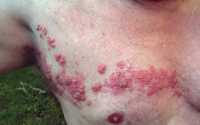
18 Dec Chemo and Some Cancers Raise Risk of Shingles
MedicalResearch.com Interview with:

Herpes Zoster – Shingles
on chest
Wikipedia image
Jiahui Qian, MPH
School of Public Health and Community Medicine
University of New South Wales
Sydney Australia
MedicalResearch.com: What is the background for this study?
Response: Herpes zoster is a neurocutaneous disease caused by the reactivation of latent varicella zoster virus and its risk is related to the cell-mediated immunity. Previous studies have reported a higher zoster risk among patients with haematological cancer and cancer patients receiving chemotherapy. However, the role of the cancer itself and the receipt of cancer treatment is not clearly separated, we therefore started this study and tried to separate the risk of zoster associated with the cancer itself from cancer treatment.
MedicalResearch.com: What are the main findings?
Response: We found that for patients with solid organ cancers, the risk of herpes zoster only appears to be elevated among those receiving chemotherapy, while for patients with haematological cancers, zoster risk is substantially higher in the years prior to the cancer diagnosis and increases further following diagnosis and treatment. Our findings suggest that risk of zoster for those with solid organ cancer is largely associated with cancer treatment and for those with haematological cancers a substantial portion of the risk is likely to be attributable to the haematological cancer itself.
MedicalResearch.com: What should readers take away from your report?
Response: Risk of zoster for those with haematological cancer is likely to be attributable to the haematological cancer itself, while that for those with solid organ cancer is likely to be associated with cancer treatment, chemotherapy to be specific.
In the year after a cancer diagnosis we estimated the incidence of zoster to be 3.4% in those with haematological cancer and 1.7% in those with solid organ cancer receiving chemotherapy. Therefore, zoster prevention strategies should be considered for cancer patients, especially those expected to receive chemotherapy.
MedicalResearch.com: What recommendations do you have for future research as a result of this work?
Response: Prevention strategies could include use of prophylactic antivirals, or new zosters vaccines which may be suitable for immunocompromised people. Further research assessing the relative benefit of such prevention strategies is needed.
Citation:
[wysija_form id=”3″]
[last-modified]
The information on MedicalResearch.com is provided for educational purposes only, and is in no way intended to diagnose, cure, or treat any medical or other condition. Always seek the advice of your physician or other qualified health and ask your doctor any questions you may have regarding a medical condition. In addition to all other limitations and disclaimers in this agreement, service provider and its third party providers disclaim any liability or loss in connection with the content provided on this website.
Last Updated on December 18, 2018 by Marie Benz MD FAAD
